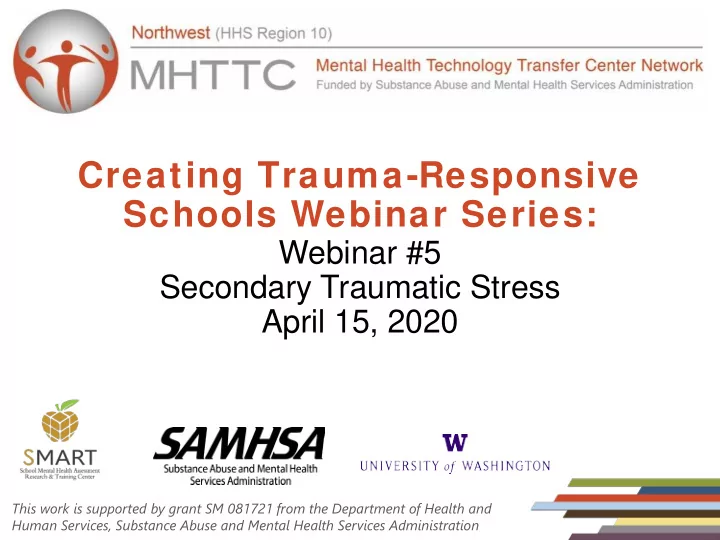

Creating Trauma-Responsive Schools Webinar Series: Webinar #5 Secondary Traumatic Stress April 15, 2020 This work is supported by grant SM 081721 from the Department of Health and Human Services, Substance Abuse and Mental Health Services Administration
DISCLAIMER The views, opinions, and content expressed in this presentation do not necessarily reflect the views, opinions, or policies of the Center for Mental Health Services (CMHS), the Substance Abuse and Mental Health Services Administration (SAMHSA), or the U.S. Department of Health and Human Services (HHS).
Creating Trauma-Responsive Schools 2019 – 2020 FREE! Webinar Series • Webinar #1: Trauma-Informed Skills for Educators (TISE) - Part 1 (of 2): Trauma 101 Date: November 13, 2019 • Webinar #2: Trauma-Informed Skills for Educators (TISE) - Part 2 (of 2): Trauma-Responsive Skills and Strategies Date: December 4, 2019 • Webinar #3: Trauma-Informed Schools and the MTSS Framework Date: February 12, 2020 • Webinar #4: Trauma-Responsive Schools Implementation Assessment Tool (TRS-IA) Date: March 18, 2020 • Webinar #5: Supports for Teachers Affected by Trauma (STAT) Date: April 15, 2020 • Webinar #6: TSA Center for Schools Evidence-Based & Evidence-Informed Practices Psychological First Aid Date: May 13, 2020 9:30 – 11:00 am (Pacific Time) Webinar Series Page with Registration Links and Recorded Webinars https://mhttcnetwork.org/centers/northwest-mhttc/new-webinar-series-creating-trauma-responsive-schools
Mental Health Technology Transfer Center (MHTTC) Network Visit the MHTTC website at https://mhttcnetwork.org/
Northwest MHTTC School Mental Health Supplement Goals : Provide direct training and TA on the implementation of mental health services in schools Build infrastructure and create learning communities Support educational leaders to promote mental health for ALL
Project Staff Kelcey Schmitz, Megan Lucy, Eric Bruns, School Mental Health Lead Program Coordinator Project Director
Get in touch! Email: kelcey1@uw.edu and mlucy@uw.edu Phone: (206) 221-3054 Websites: • MHTTC: https://tinyurl.com/nwsmh • UW SMART Center: https://depts.washington.edu/uwsmart/ Sign up for our New sletter! https://tinyurl.com/smh-news Follow us on social media! @NorthwestMHTTC Northwest MHTTC
Evaluations • Required by our funder • Used to inform, refine, & enhance future events/activities • Helps communicate the need for this type of support • Voluntary and anonymous • Very important! We will end a few minutes early and ask that you please take a few moments to complete.
Dr. Stephen P. Hydon Steve Hydon, MSW, EdD is a clinical professor in field education and serves as chair of the Pupil Personnel Services Credential program. His interests are in child welfare, secondary traumatic stress and social work practice in schools. Hydon developed a secondary traumatic stress survey for teachers and mental health practitioners in schools and is a consultant to the U.S. Department of Education as an educator resilience facilitator. He has trained nationwide on secondary traumatic stress, compassion fatigue, educator resilience and the Psychological First Aid - Listen, Protect, Connect, Model, and Teach curriculum for school personnel. He is a member of the National Child Traumatic Stress Network and the Trauma and Services Adaptation Center for Resiliency, Hope and Wellness in Schools. He also serves as the liaison to the NCTSN’s Terrorism and Disaster Center and sits on the board of the American Council on School Social Work. Previously, he served as a board member of the School Social Work Association of America and was vice president of the California Association of School Social Workers for more than seven years.
Secondary Traumatic Stress Causality and Impact Dr. Stephen P. Hydon
AGENDA Understanding of Secondary Traumatic Stress • Resiliency • Secondary Traumatic Stress Risk Factors • Signs of Secondary Trauma • Impact of Secondary Traumatic Stress • Self-Care/Five Pillars of Thriving • Support for Teachers Affected by Trauma (STAT) • . AGENDA | 2
DEFINITIONS “Forget your perfect offering. There is a crack in everything. That’s how the light gets in…” - Leonard Cohen Secondary Traumatic Stress Compassion Satisfaction DEFINITIONS | 3
RESILIENCE Definition Creating supportive environments Post-traumatic growth RESILIENCE | 4
SECONDARY TRAUMATIC STRESS RISK FACTORS • Counter transference • Personal Experience with a traumatic event(s) • Direct contact with children’s stories • Helping others/neglecting yourself • Empathy vs. Sympathy STS Risk Factors | 5
SIGNS OF TRAUMATIC STRESS • Connection to those you help • Irritable • Too hard on yourself • Self esteem • Lack of focus • PTSD reactions STS Signs | 6
IMPACT OF SECONDARY TRAUMATIC STRESS Emotional • Feeling numb or detached; living in denial Physical • Having low energy or feeling fatigued Behavioral • When STS impacts our behavior, we often change our routine of things… Professional • STS impact your work effort or create low performance of job tasks and responsibilities. STS Impact | 7
IMPACT OF SECONDARY TRAUMATIC STRESS CONT’D Cognitive • Confusion, diminished concentration, difficulty with decision making Spiritual • You may question the meaning of life Interpersonal • Physical withdrawal or emotionally unavailable to your co-workers or your family STS Impact | 8
SELF CARE DOMAINS • Physical • Intellectual Environmental • • Emotional • Occupational • Emotional • Spiritual Self-Care | 9
SELF CARE BARRIERS and SUCCESSES • Guilt • Motivation – choice, knowledge, persistence • Time ---------------------------------------------------------------- • Contract • Significant others • Group-work • Measurable and manageable Self-Care Cont’d | 10
Five Pillars of Thriving 1. positive emotions 2. engagement 3. positive relationships 4. meaning 5. accomplishment Five Pillars Thriving | 11
Five Modules of On-Line Learning, primarily for Tk-12 Grade Educators Preliminary Feedback www.statprogram.org
Module 1 Overview of Secondary Traumatic Stress
Module 2 - Risk Factors for STS • Student Populations Personal Characteristic Traits • • School Environment
Module 3 Assessment of Secondary Traumatic Stress
Module 4 – Impact of Secondary Traumatic Stress
Module 5 Self Care
Contacts Sara Rahmanian SRahmanian@mednet.ucla.edu Steve Hydon hydon@usc.edu Sheryl Kataoka SKataoka@mednet.ucla.edu
THOUGHTS, RELFECTIONS, QUESTIONS Q&A | 16
Evaluations • Required by our funder • Used to inform, refine, & enhance future events/activities • Helps communicate the need for this type of support • Voluntary and anonymous • Very important! We will end a few minutes early and ask that you please take a few moments to complete.
Recommend
More recommend